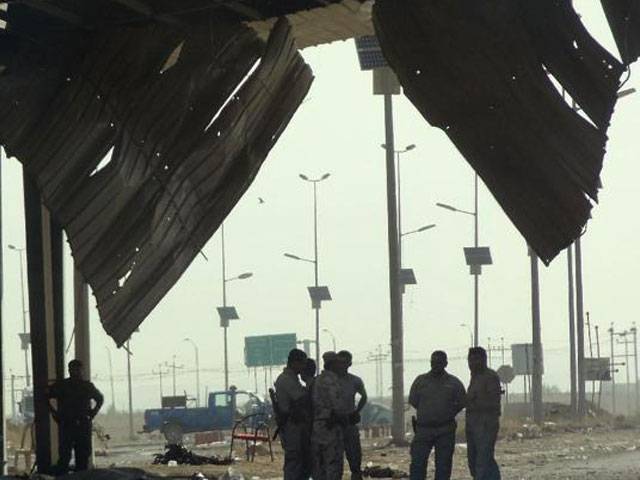BAGHDAD/ LONDON - Iraqi forces Saturday beat back an assault on Haditha in Anbar province, strategic for its large nearby dam, as the UN warned politicians must quickly form a new government or risk ‘chaos’.
Fighting also erupted in the central province of Diyala as security forces battled militants who have seized swathes of territory and a string of towns and cities in an offensive launched on June 9. The violence comes a day before Iraq’s deeply-divided politicians are to hold a parliament session aimed at reviving flagging efforts to form a government in the face of the jihadist-led onslaught.
UN envoy Nickolay Mladenov on Saturday warned Iraqi politicians that ‘failure to move forward on electing a new speaker, a new president and a new government risks plunging the country into chaos’. ‘It will only serve the interests of those who seek to divide the people of Iraq and destroy their chances for peace and prosperity,’ he said. The attack on Haditha, located northwest of Baghdad in Anbar province on the road linking militant-held western areas and the provincial capital Ramadi, began with mortar fire, police said. Gunmen travelling in vehicles, including some captured from security forces, then attacked from two sides but were kept from entering the town in fighting that left 13 militants and four police dead, officers and a doctor said.
Previous attacks on Haditha were of a smaller scale and the capture of the dam by the militants would raise the prospect of it being used to cut water or flood areas downstream, as happened earlier this year elsewhere in Anbar. In Diyala province, meanwhile, security forces and civilian volunteers Saturday launched a push to retake militant-held areas north of Muqdadiyah, a town on a main road to provincial capital Baquba, a police captain said. But in a setback for government forces, militants overran the Shiite-majority towns of Al-Tawakul and Al-Zarkush in the province, displacing local residents, witnesses said.
In Jalawla, another Diyala town, Kurdish peshmerga fighters began a major operation to expel militants from areas they hold, a senior Kurdish officer said. Major General Hussein Mansur said Kurdish forces were using tanks and artillery in the battle, and had succeeded in retaking territory from the militants. Security forces folded during the initial offensive led by the Islamic State jihadist group, prompting the government to announce that it would arm civilian volunteers, thousands of whom have since signed up.
Moreover, Iraqi security forces and government affiliated militias appear to have unlawfully executed at least 255 prisoners over the past month in apparent revenge for killings by Islamic State fighters, according to a rights group on Saturday. Human Rights Watch (HRW) said the killings had taken place in six Iraqi towns and villages since June 9 and at least eight of the dead were boys under 18. In all but one case, the killings took place while the Iraqi forces were fleeing from Islamic State militants and other armed groups, it said on its website. The vast majority of security forces and militias are Shi’ite, while the murdered prisoners were Sunni, it added.
The militants have made no attempt to hide mass executions of their prisoners. Days after they began sweeping through northern cities last month, they released videos showing their masked fighters machine-gunning captive government soldiers lying in shallow graves. HRW said it had statements from witnesses, security forces and government officials indicating Iraqi soldiers or police, pro-government Shi’ite militias, or combinations of the three had extrajudicially executed prisoners, in nearly all cases by shooting them.
It said it had documented five massacres of Sunni prisoners between June 9 and 21 - in Mosul and Tal Afar in northern Nineveh province, in Baaquba and Jumarkhe in eastern Diyala province, and in Rawa in western Anbar province. It said residents and activists those areas believed Iraqi security forces and militias killed Sunni prisoners released by Islamic State, to stop them joining the rebellion and in revenge for the killings of government troops. Joe Stork, HRW deputy Middle East director said gunning down prisoners was ‘an outrageous violation of international law’. ‘While the world rightly denounces the atrocious acts of (Islamic State), it should not turn a blind eye to sectarian killing sprees by government and pro-government forces,’ he said.
Friday, April 26, 2024
Iraq forces beat back assault as UN warns of ‘chaos’
Execute 255 prisoners in revenge for Islamic State killings

Caption: Iraq forces beat back assault as UN warns of ‘chaos’
Vloggers Shiraz, Muskan cross 2m followers on Instagram
12:27 AM | April 26, 2024
Achakzai stresses collective wisdom to address country's crises
12:27 AM | April 26, 2024
IHC puts off cipher case hearing until April 30
12:26 AM | April 26, 2024
Nawaz Sharif convenes PML-N Punjab meeting tomorrow
12:25 AM | April 26, 2024
ECP reinstates PTI-backed MNA from NA-81 Gujranwala
12:24 AM | April 26, 2024
Academic Uprising
April 24, 2024
Cooperation Momentum
April 24, 2024
Facing Reality
April 24, 2024
Absent Academia
April 23, 2024
Murree’s Redemption
April 23, 2024
Ending animal suffering
April 25, 2024
AI governance
April 25, 2024
AI concerns
April 25, 2024
Population paradox
April 24, 2024
Unveiling differences
April 24, 2024
ePaper - Nawaiwaqt
Advertisement
Nawaiwaqt Group | Copyright © 2024





